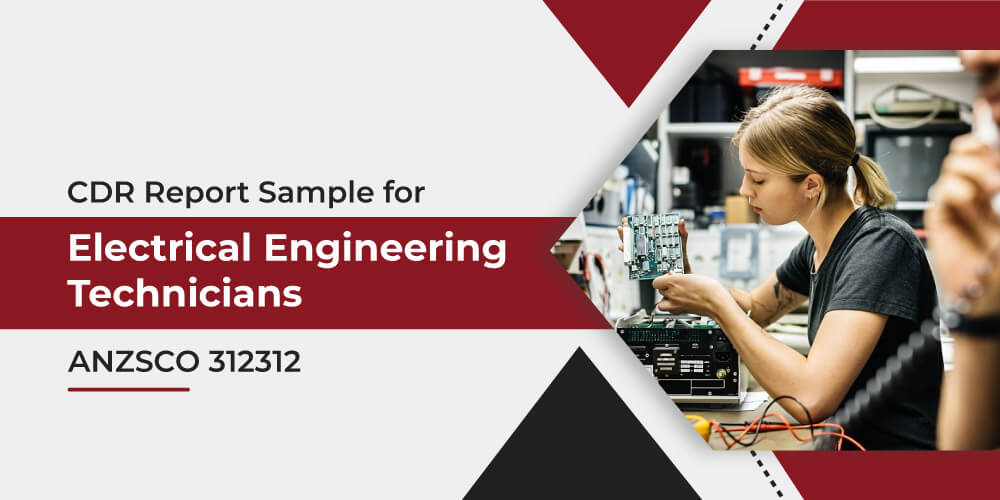Electrical Engineering Technicians interpret designs and technical instructions from an electrical engineer and assure that they are precisely implemented. They also help in developing, installing, testing, and maintaining equipment that generates, transmits or utilizes power. To become an Electrical Engineering Technician, a formal qualification in electrical engineering technology is required.
CDR sample for Electrical Engineering Technician includes all the required reports such as Curriculum Vitae (CV), Continuing Professional Development (CPD), three Career Episodes (CE), and Summary Statement. The content of the CDR Report Samples is given below:
CDR Sample for Electrical Engineering Technician

CDR Sample for Electrical Engineering Technician
Curriculum Vitae (CV)
Continuing Professional Development (CPD)
Electrical Engineering Technician Career Episode Sample 1
Electrical Engineering Technician Career Episode Sample 2:
Electrical Engineering Technician Career Episode Sample 3:
Electrical Engineering Technician Summary Statement Sample:
Electrical Engineering Technician Career Episode Sample 1
Project Name: Optimal Allocation of Static and Dynamic Reactive Power Support for Enhancing Power System Security
In the first Career Episode, the author explains the project titled “Optimal Allocation of Static and Dynamic Reactive Power Support for Enhancing Power System Security” that he accomplished as a team leader for the partial fulfillment of the requirements of his Bachelor’s Degree. His responsibilities were:
- To determine the degree and nature of the problem regarding voltage.
- To develop a technique to identify severe contingencies and vulnerable buses so as to outline the voltage prone areas in the network that requires reactive power support.
- To develop a methodology to properly identify the optimal locations with diminished integer optimization complexity.
- To develop a methodology for optimally allocating static and dynamic VAR source for a single contingency.
- To develop a methodology with decreased complexity for optimally allocating static and dynamic VAR source for multiple severe contingencies taken into consideration concurrently.
Electrical Engineering Technician Career Episode Sample 2
Project Name: Evaluation of Microwave Microscopy for Dielectric Characterization
In the second Career Episode, the author explains the project titled as “Evaluation of Microwave Microscopy for Dielectric Characterization”in which he involved when he was a PHD student at University of Birmingham. His key responsibilities in this project were:
- To calculate and derive the standard samples.
- To implement the measurement process of dielectric samples.
- To check the coupling coefficient’s effect.
- To demonstrate the uncertainty in the measurement of the relative permittivity of bulk samples.
- To demonstrate the drawbacks of the image charge model extended to thin films.
Electrical Engineering Technician Career Episode Sample 3
- To assume the electric energy and consumption of power by fleets of light-duty PEVs.
- To investigate electronics topologies of on-board power for bidirectional vehicle to grid and grid to transfer of power vehicle.
- To determine the impacts on distribution systems from PEVs under aggregator control.
- TTo investigate the electricity’s pricing by PHEV aggregators and how it affects the process of making decision of a cost-conscious PHEV owner.
- To model light duty PEVs for long-term energy and transportation planning at a national scale.
Free Consultation
CDR Report Samples
- On Time Delivery
- 24/7 Service
- Plagiarism Free Work
- Domain Specific Writers
- All Engineering Disciplines
- Best Price Guarantee
Give us a call at +61 483 914 303
directly for immediate query and fast assessment!
Feel free to contact our friendly team of writers with any questions you have.

